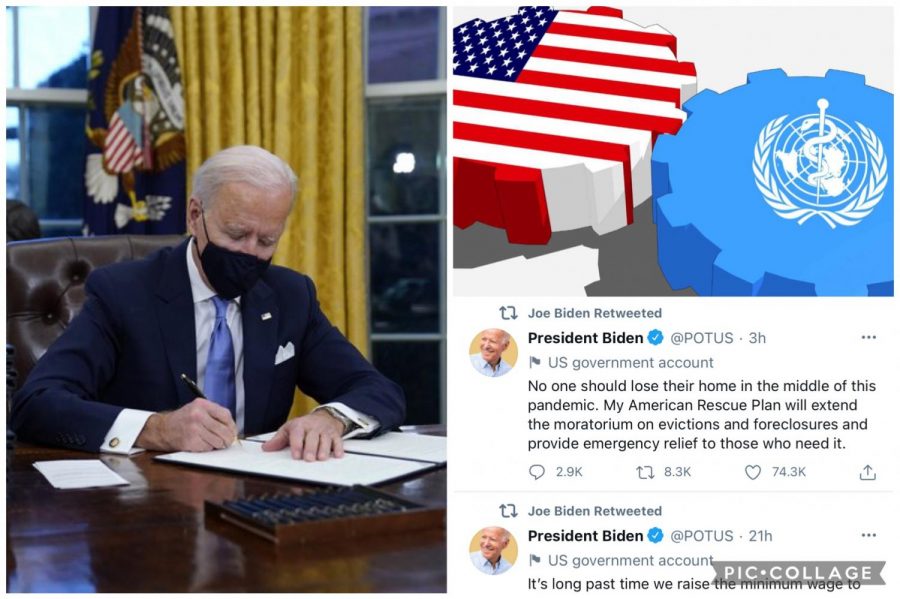Biden’s First Days
Although inauguration day was not too long ago, President Biden and his team have already made several impactful changes. Among the changes, the United States rejoined the World Health Organization.
February 12, 2021
After four years of Republican control, the Democrats were able to gain much ground in the 2020 election, winning the majority in both houses of Congress and the presidency. This major change to government rule will hopefully allow the government to pass more legislation and make lasting change. Many of the changes made recently were made using executive power. On Biden’s first day in office, he signed 17 executive orders, undoing many Trump-era policies, like the ban of transgender people in the military. Biden’s level of productivity of his first days in office is remarkable. Traditionally, the president will make the most changes within their first hundred days. During this period, they will propose a federal budget, get their cabinet confirmed, and come face to face with international and domestic problems. During the first hundred days, a real sense of what the rest of the presidency will be like is established, and Biden and his team hit the ground running.
With Trump’s impeachment process taking up the Senate’s time, the cabinet confirmation is much slower than previous administrations. Obama had six approved by the time he took the oath of office, while Biden has had only 23 of 52 approved, four of which require Senate confirmation. Crucial positions have not been confirmed due in part to the confusing transition and other Senate procedures.
Biden is committed to passing his 1.9 trillion dollar COVID-19 relief package. He recently met with 10 Republican Senators in the oval office to drum up support, successfully fulfilling his pledge for unity. They proposed a slimmed-down bill that they believe can win bipartisan support, but Biden is not willing to compromise yet. He hopes that the finalized bill will contain robust stimulus checks, so they can pay rent and other bills. It would include direct checks for 1,400 dollars to every American. $416 billion would go to vaccine rollout to meet his goal of 1 million shoots in 100 days. It would also provide funding for small businesses, schools, and childcare. Additionally, it would enhance federal unemployment benefits to help those who have lost their jobs due to the pandemic.
Coming into office Biden has been committed to bipartisanship which has been lost in the last few years. This is demonstrated by his push to gain republican support on his COVID relief bill.
As mentioned before, during his first few days he signed numerous executive orders. Many focused on the environment. He rejoined the Paris Climate Accords and canceled the plans for the Keystone XL pipeline. He plans to refocus on the environment after the damage done during the Trump administration.
Following the summer’s protests regarding racial equity and the justice system, many of Biden’s actions focused on racial equity. The ban on private prisons is something that will take away one incentive to put people in prison. People will no longer make money off of people going to prison. He formed the COVID equity task force to ensure that the disparities surrounding race, ethnicity, and other factors will be uncovered and solved. He also removed the ban on travel from majority-Muslim countries, pulled federal funding from the border wall, ensuring that undocumented immigrants would be counted in the census, and protected the Deferred Action for Childhood Arrivals.
He also instituted other protections for LGBTQ+ Americans that banned discrimination for gender identity and sexual orientation.
In addition, placed a mask mandate on all federal property and expanded many different things to help those affected by the pandemic from pausing student loan payments to expanding access to COVID treatments.
There has been a lot of action over the last few days, and there will be much more to come in the days ahead. However, this is just a brief overview. For a full, comprehensive list of Biden’s actions read this NBC article.



















